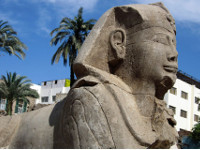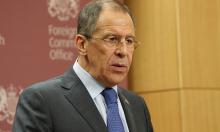Egypt's Mursi slips on necrophilia
At the end of the first full year of his presidency, Mohammed Mursi saw mass protests and demonstrations demanding his resignation on the streets of Egypt. The time when pro-democratic Egyptians rejoiced at the resignation of the autocratic Mubarak has vanished from people's memory. So what are the results of Mohammed Mursi's presidency?

Unfortunately, the Muslim Brotherhood, supported by the president, has not been very well. From the moment when tens of thousands of people took to the streets to protest the introduction of changes in the constitution of Egypt, journalists largely assumed that Mursi would not retreat. Everyone understood that Mursi's guarantees were only verbal, and the political biography of the president suggests that he will not become a "compromiser."
Mohammed Mursi Issa al-Ayat was born August 20, 1952 in the province of Sharqiya. According to his resume, he received a master's degree in engineering (Cairo University) and is a candidate of technical sciences (University of Southern California). He started his political career as a member of the commission on the resistance to Zionism. In 2000, he was elected a member of the Assembly of Egypt, Muslim Brotherhood. At the last National Assembly elections in 2005, he received the largest number of votes, but his opponent took the lead after the second round.
In 2000-2005, Mohammed Mursi was considered one of the most active members of the parliament. However, the Freedom and Justice Party, which includes the Muslim Brotherhood, approved Khairat al-Shater as a candidate for the presidential elections of 2012. Nevertheless, on April 7, 2012, Mursi became its reserve. It was a kind of a precautionary measure in the event of legal obstacles to appear for al-Shater. The Committee on Presidential Elections excluded el-Shater from the race on April 17, 2012, along with nine other candidates. Mohammed Mursi thus became the main candidate from the Party of Freedom and Justice. It is worth noting that, unlike his colleagues, Mursi had not served many years in jail, nor had he fallen a victim of persecution.
Mursi's uncompromising behavior was vital to the success of the new party. Despite the initially formed political coalition with more than 40 organizations, Mursi stubbornly insisted that the candidates from the Freedom and Justice Party should have a greater number of seats in the parliament. As a result, the coalition collapsed, and Mursi won 47 percent of parliamentary seats.
Of course, during his short presidential campaign, Mursi met with a wide range of Islamist leaders and revolutionary youth activists. He promised them to govern together, including through the appointment of women to senior positions in the government. In the end, after the elections, Mursi surrounded himself with affiliated Muslim advisers and filled his cabinet with ideological technocrats.
Mursi is unlikely to compromise with the general public, due to his familiarity with the unprecedented opportunity of the Muslim Brotherhood to get mobilized. In particular, the organization consists of so-called "families" that are based on almost every Egyptian area. During last year's revolution, the structure was vital to ensure turnout and addressing key issues of the uprising. Mursi is responsible for the activities of commanders. He remains confident that he can easily crush his current opponents, so he is unlikely to actively respond to the protests.
The Egyptians, when supporting Mursi, sincerely hoped that the democratically elected President would adhere to the ideals of the majority. Apparently, they were not the only ones, who were misled by insincere rhetoric and persuasion. The year of Mohammed Mursi's presidency was characterized by impartiality and non-fulfillment of promises. Mursi's party attempted to legalize necrophilia against women. Even though the Brotherhood claimed that they supported fundamental human rights, a few days before the election the organization tried to promote the law allowing husbands to have sex with their dead wives during six hours after their death.
Mursi's party pledges support to Israel. At about the same time, the newly elected Mohammed Mursi publicly and favorably reached his presidential helping hand to Iran and Palestine. A necessary condition for the functioning of democracy is a possibility to criticize the government. However, instead of defending democratic ideals, the Egyptian authorities arrested a comedian, who dared to make fun of the regime. Contrary to pre-election promises to stabilize the Egyptian economy, the situation worsened after 12 months of Mursi's presidency. The country suffers from serious shortage of fuel and electricity; prices and unemployment continue to grow.
After Mursi, the newly-born president, who received 51.7 percent of the vote at the election, was sworn in, he gave broad powers to the military and forced Field Marshal Hussein Tantawi out from the country (he is considered the head of state after the fall of Hosni Mubarak).
In December, the Constituent Assembly approved a new constitution and attempted to pass it through a referendum. The voter turnout was extremely low, and Egypt plunged into a political crisis. In January 2013, on the eve of the second anniversary of the uprising, demonstrators clashed with police, 60 people were killed. In May of this year, at the request of the opposition, Mursi reshuffled his cabinet. In June, the Supreme Court of Egypt found the Islamist majority in parliament, which also assumed the legislative role, illegal.
The President said that the government would remain in office until new candidates were elected. Tens of thousands of Islamists gathered for protests. Defense Minister Abdel Fattah al-Sisi warned that the army would intervene should violence occur. It was reported that before the protest meeting, which took place on June 30, 2013, more than 22 million people signed a petition demanding the resignation of Mursi.
Through his spokesman, Mursi made it clear that he was not going to step down. As a result, thousands of Islamists flooded the streets of Cairo. The protesters sought to make it clear that the country turned its back on Mursi. Demonstrators were walking along the streets, waving flags. Men and women, some of them with small children, were beating drum, singing and dancing.
What's next? Protesters vowed to remain in the streets until the president's resignation.
In a potentially explosive confrontation, a few dozen young men attacked the office of the Muslim Brotherhood, throwing firebombs at the building. The people, who were inside, opened fire at the attackers; four were killed. Enraged protesters marched to restore justice, the militants opened fire. The protesters clashed with security forces. To date, according to Egypt's Ministry of Health, about 600 people were injured and seven were killed.
Egyptian President Mohammed Mursi did not agree to accept the ultimatum from the Supreme Council of the Armed Forces. Egyptian state news agency MENA reported that Foreign Minister Mohamed Kamel Amr resigned. It was previously reported that eleven government ministers also applied for resignation.
Sergei Vasilenkov
Pravda.Ru
Subscribe to Pravda.Ru Telegram channel, Facebook, RSS!




